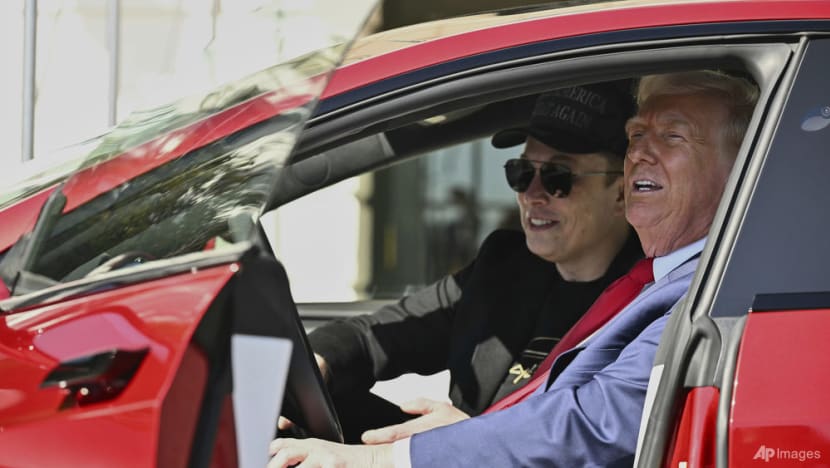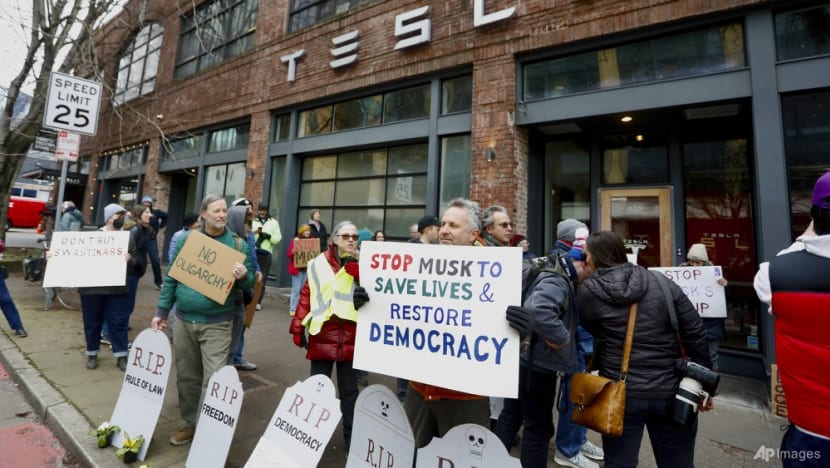‚ÄėNothing to do with Elon‚Äô: More Teslas hit the road in Singapore despite CEO Musk‚Äôs political controversies
In other parts of the world, the Trump adviser's decision to switch gears from entrepreneur to partisan political player has led to a fall in brand sentiment.

US President Donald Trump and Tesla CEO Elon Musk speak to reporters as they sit in a red Model S Tesla vehicle on the South Lawn of the White House Tuesday, Mar 11, 2025, in Washington. (Pool via AP)

This audio is generated by an AI tool.
SINGAPORE: Tesla's brand and business remain sturdy in Singapore, even as other parts of the world have pushed back against the car company in response to its CEO Elon Musk's support for United States President Donald Trump. 
According to data from the Land Transport Authority's website, there were 262 new Tesla car registrations in January and February this year in Singapore, up from 137 in the same period last year.
Owners here told ¬ť∂Ļ said they were unconcerned by the impact of American politics on Tesla's image, and were more interested in the performance of their vehicles on the roads.
Globally, Mr Musk’s decision to switch gears from entrepreneur to partisan political player has led to a fall in brand sentiment. 
Tesla shares have plunged by nearly 40 per cent over past weeks, chalking up losses ever since Mr Musk was given the task of slashing government spending and headcounts through a Department of Government Efficiency (DOGE) in the US.
Protests have taken place outside Tesla showrooms in the US, vehicle owners have been harassed and some have reported buyer’s remorse.
Sales and share prices have also plummeted in Europe, along with multiple reports of Teslas being vandalised.

PAYING NO HEED
None of these developments bother Tesla owner Alvin Khoo, who got his vehicle in April last year. 
‚ÄúPolitics are macro factors which only have a temporary effect on the brand,‚ÄĚ said the 40-year-old, who runs two live band companies.¬†
‚ÄúWhat matters are the intrinsic factors of the company - (that) it‚Äôs a good car with one of the best technologies, and it‚Äôs a very comfortable ride,‚ÄĚ added the Tesla Model Y Long Range owner.
‚ÄúThat‚Äôs all that matters when I decide to buy the car.‚Ä̬†
Agreeing, accountant Malcolm Loh said there was no relation between owning a Tesla and whatever views one might have of its CEO. 
‚ÄúMy choice of getting a Tesla had nothing to do with Elon at all, just like my choice of buying Apple iPhones over the years has nothing to do with Tim Cook (Apple's CEO),‚ÄĚ said the 58-year-old, who has owned a Tesla Model Y since 2022.¬†
‚ÄúFor me, a product‚Äôs value for money is the most important consideration.‚Ä̬†
While Tesla owners overseas appear to have been discriminated against, ‚Äúthankfully no such actions have taken place here in Singapore‚ÄĚ, he added.
Mr Loh said the brand's current turmoil could even be a blessing in disguise. 
“The lesser demand for Teslas may result in the company reducing prices, so hopefully when the time comes to replace my Tesla with another one, it will be much more affordable." 
Another owner in his 40s, who only wanted to be known as Jason, said he didn't care about Tesla's image as a current owner. But he would have his concerns when the time comes to sell his car.
He's planning to switch to a Chinese EV brand after facing some technical issues with his Tesla. 
‚ÄúPerception of the brand worries me only because of resale value implications,‚ÄĚ he said.¬†
But Jason remained generally optimistic. 
‚ÄúI don't think Singaporeans are too affected by what goes on in the US ... The Singapore car market is robust (and) I don't foresee its resale value going lower than normal depreciation,‚ÄĚ he said.¬†
A "POLITICAL" CAR? 
Asked about Tesla owners in Singapore not being swayed by trends elsewhere, sociologist Tan Ern Ser said part of the reason was that ‚Äúnot everyone is following US politics closely, neither do they see it as relevant‚ÄĚ.¬†
Even if interest in US politics increases, it may still not lead to a spillover effect on the people who gravitate towards Teslas, ‚Äúas long as the cars serve their purpose‚ÄĚ, said¬†Associate Professor Tan, who's from the Institute of Policy Studies think-tank.
But it might be a different case for those planning to sell their vehicles, like Jason. It might also affect those who bought their Teslas before the dip in shares and hence feel a sense of "paper loss", he added.
And sentiments might shift if the material lives of Singaporeans start to be affected by US political decisions.
‚ÄúIt may eventually catch up with Singaporeans if or when the effect of Trump's tariffs hit our economy,‚ÄĚ said Assoc Prof Tan.¬†
He was unsurprised by the repercussions seen elsewhere, of Mr Musk's politics on what is otherwise a consumer object.
‚ÄúThis polarisation (casued) by right-wing politics gives permission for people to adopt its nastiness and mean-spiritedness; and a tendency for every aspect of social, economic life to become highly politicised and weaponised,‚ÄĚ he said.¬†
‚ÄúA car will eventually no longer be just a car, but a political object.‚Ä̬†
New analysis shows Tesla shares have plunged by almost 40 per cent over the past six weeks, racking up losses every week since CEO Elon Musk made his high profile move to Washington in support of President Donald Trump. Experts say Tesla has been hit by a fall in brand sentiment, led by consumers exercising caution over Musk's decision to switch gears from entrepreneur to partisan political player. Trent Murray has more on the story from Berlin.










